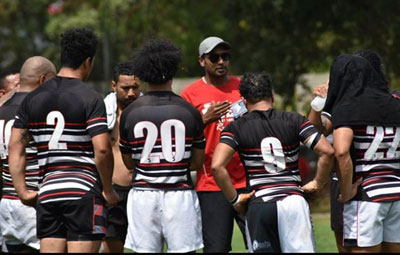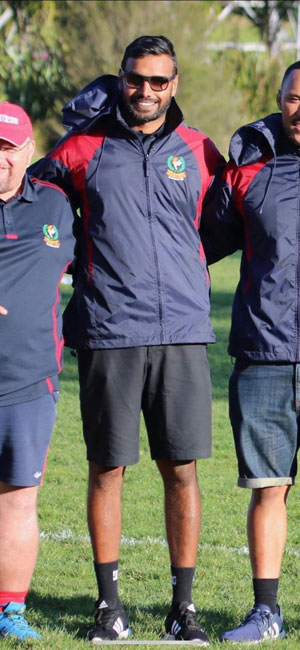Innovation is key in rugby – Coach ‘Nira’
Former Trinity and Kandy SC lock forward Niranjan Ranasinghe is perhaps the only Sri Lankan rugby star who has been both player and coach of a Premier rugby club in the land of the All Blacks. In fact, his hidden talents came to fore when he landed in New Zealand as he switched from second row to third row playing as a blindside flanker before becoming a graduate in High Performance Rugby at Otago Sports Institute specialising in strength and conditioning.
“In New Zealand I transformed into a loose forward and played No.6 and 7 as blindside flanker. I improved a lot, especially the catch and pass, and running game,” said Ranasinghe who had speed and agility having played in the backline during his younger days and taking part in long and high jump events in athletics at school.

Taking charge of training session at Manukau Rovers RFC
A member of Trinity’s Bradby winning teams in 1999 and 2000, Ranasinghe represented Kandy SC from 2001 to 2004 being part of their winning sides.
“The main influence for me was my late father Ranjith Ranasinghe. He used to take me for Kandy matches. He was not a ruggerite but a huge rugby fan. He inspired me to watch every single game growing up,” said Niranjan, who also played cricket for Trinity at Under-13 and 15 level as an allrounder.
He represented Sri Lanka at the Rugby Asiad held in Colombo playing against Japan, Hong Kong and Arabian Gulf in 2002 coming under the influence of legendary New Zealand coach George Simpkin.
Ranasinghe caught the eye of Kandy and subsequently national selectors when he turned out for CH&FC Under-21 team in 2000 where he came under the wing of coaches Tony Amit and M.D. Ifthikar.
“Ifthikar really helped me. He was the one who gave me some tools. I played really well in that Under-21 tournament. That’s how I was approached by Kandy trainer, late Alex Lazarus and got into Kandy. From there onwards my main mentor was George Simpkin. He took me to a different level along with Priyantha Ekanayake,” recalled Ranasinghe, who migrated to New Zealand in 2003 with his wife Dr Maithri Gurusinghe whose grandfather was the late Bobby Jayaweera, a reputed boxer and rugby player.

Niranjan Ranasinghe
“She had to get back to her studies and I had to make a decision to play rugby or come over here. It was the best decision,” said Ranasinghe, who continued his playing career making his debut in 2005 for Suburbs RFC coached by former Kandy star ‘Laga’ getting his first exposure to Premier rugby in Auckland.
He represented the Dunedin University team in 2006 and 2007 and played a season for Sumner RFC in Christchurch, coached by current Crusaders coach Scott Robertson before hanging up boots.
He got into the strength and conditioning world as a trainer and coach in 2009 starting off with Les Mills, a corporate gymnasium doing personal training and group fitness. Then he met the Franks brothers Ben and Owen.
He was with them when they were All Blacks in 2010 and ended up being head coach at the Franks Brothers gym till 2014.
“During that time I got a lot of exposure to All Blacks and Crusaders players in Christchurch and Canterbury,” said Ranasinghe, who was strength and conditioning coach for Linwood RFC, an ‘A’ division club in Christchurch during which time he worked with professionals such as Israel Dagg, Zac Guildford and also the Franks boys.
Back in Auckland, he was head strength and conditioning coach of College Rifles RFC whey they came into semi-finals of the Gallagher Shield in 2016, 2017 and 2018.
He got his first coaching opportunity in 2017 as the Forwards and Defence coach of College Rifles Under-21 team.
“That’s where I figured out I had a coaching skill as well. That’s when everyone identified I should coach as well,” said Ranasinghe who was part of Auckland ‘Colts’ in 2018 and 2019. After a short stint with Warriors in the NRL he made his debut as a Premier rugby coach in 2018 being Technical Adviser and Forwards coach of Suburbs RFC, the very first club he played.
Armed with a World Rugby Level 3 qualification, last year he was appointed Assistant coach and Backs coach of ‘A’ division side Manukau Rovers where another Sri Lankan, Ravindu ‘Boa’ Athukorale was Technical Adviser.
“He is one of my mentors as well. He helped me to take my coaching to a different level as a friend and mentor and a fellow coach. Him and I also innovated STF (Safe Tackle Framework) and the 8-week module Rugby Masterclass Education Series where Ravi Wijenathan and Shah Doole were the first students,” he said.
Unlike here, in New Zealand everyone is a volunteer until they become a representative coach.
“In New Zealand we love to share with the world. There are 16 teams in Premier rugby in New Zealand. We share stuff even during the season,” he said.
“The important thing is innovation – values and beliefs and system and process,” underscored Coach Nira, 39, as he is known in New Zealand.
He debunked the myth that professionalism is the cure to develop the sport.
“New Zealand ‘A’ division players are not professional players. They go to work and only train twice a week on Tuesday and Thursday and play rugby on Saturday. That shows their work ethic, their willingness to do their own fitness and hone their skills,” he explained.
He feels Sri Lankan coaches need to focus on organisational skills.
“We have to get our fitness level up. We need to introduce a hardworking culture and get used to systems and processes. I think those are things we need to teach. How to manage your time in a week and break things down,” he explained.
“As coaches we always have to innovate. It is not only about sitting an exam and getting a qualification behind you. You have to think laterally and also simplify. Then the players understand. The other thing is hardworking culture – 99% is practice because you will only get 1% opportunity to go and execute the skill,” he said.
Comparing standards during his era and now, Ranasinghe felt school rugby has improved but fitness of club players had declined.
“It is definitely on a higher level than club rugby in Sri Lanka. During my time and before it was the opposite. In my eyes club rugby has gone backwards,” he opined.
“Nowadays we have to manage players a lot. We need to have a thorough system and a process. We need to learn to work together. It’s all about working towards one goal, one vision. Then you have values and beliefs. Then it comes to system and process,” he reiterated.
He advised players not to depend on rugby for their livelihood.
“Whether you play rugby or cricket, you can’t really depend on the sport as a career. You got to have an academic side. That’s my experience,” said Ranasinghe, who was fortunate to have Crusaders coaching staff as mentors including Scott Hansen and Scott Robertson.
Coach Nira also had a pragmatic solution to win the loyalty of players without running behind stars.
“I won’t spend big bucks and buy one or two players. I would look at young players who can develop to become stars like Fazil Marija and then invest in them and get a big group. Personally, I would look for more talent and help them to get better but not going for the best of the best,” he said.
He also urged coaches to innovate with strategic planning and think out of the box instead of replicating styles of others.
“Skill-wise we have brilliant players. It’s how they play as a team that we need to change. We need to really understand as coaches first of all what our players are like. Depending on that, we have to come up with a strategy. If we think we are going to play like All Blacks or England or Australia, I think we are not doing the right thing. Then we are copying and pasting. We have a lot of coaches who have lots of paper but we just need to think outside the box. Innovation is the key,” he reiterated.


